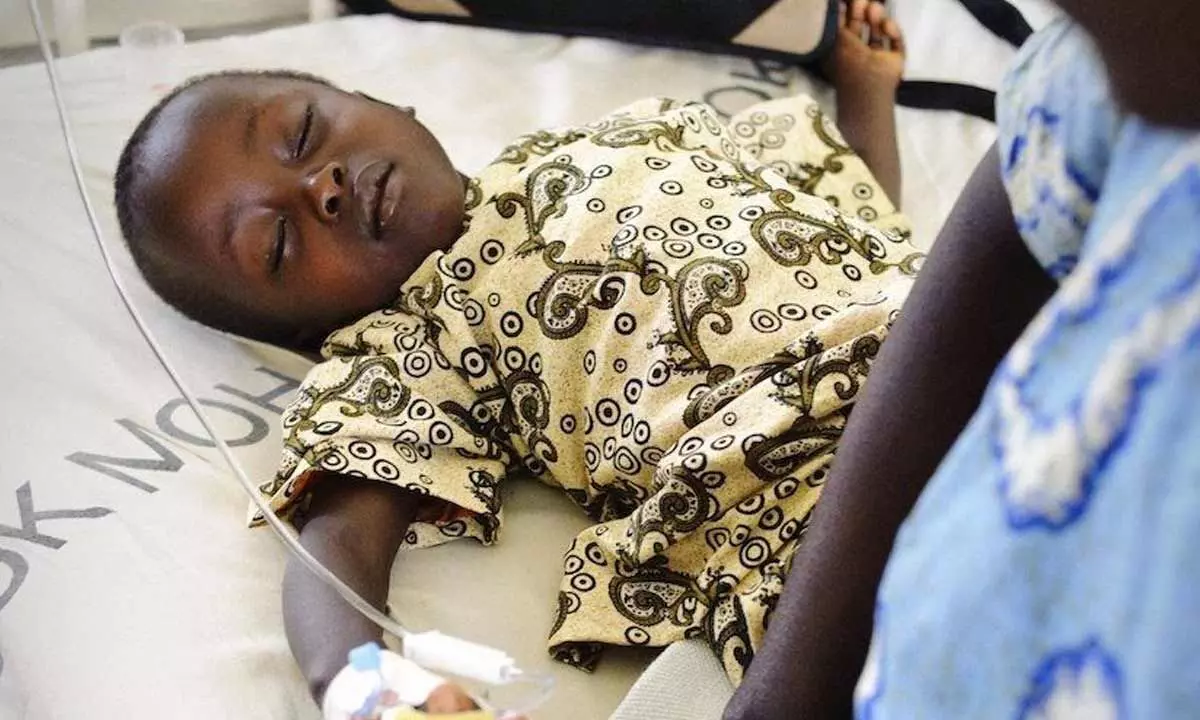Paving the way for a global malaria vaccine

Paving the way for a global malaria vaccine
Malaria impacts India more than anywhere else in southeast Asia, but relief could be on the way if the early promise of vaccines in development is fulfilled. Malaria remains a deadly disease around the world, primarily affecting children below the age of five.
Malaria impacts India more than anywhere else in southeast Asia, but relief could be on the way if the early promise of vaccines in development is fulfilled. Malaria remains a deadly disease around the world, primarily affecting children below the age of five.
In southeast Asia, India is bearing the brunt, accounting for 80 percent of the region's malaria burden. However, the nation's investment and support for control and elimination programmes is beginning to pay off, as India's vaccine research and development begins to offer signs of hope. Malaria parasites have a complex life cycle and we still don't fully understand the immune response to infection.
What we know is that people who are repeatedly exposed to malaria develop immunity to the disease. Because malaria immunity can be acquired, it suggests a malaria vaccine would be possible. But the complexity of the malaria parasite makes developing a vaccine against any stage of the parasite a formidable challenge. Injecting irradiated sporozoites (an early stage of the malaria parasite that infects liver cells) or transferring antibodies from malaria-immune adults can protect others from infection.
The RTS,S — also known as Mosquirix — is the world's first WHO-approved vaccine against the type of malaria caused by the Plasmodium falciparum parasite. The vaccine is based on a protein expressed on the surface of sporozoite, called circumsporozoite protein (CSP). The vaccine is under evaluation in the Malaria Vaccine Implementation Programme (MVIP) in Ghana, Kenya, and Malawi.
Ongoing studies have shown the vaccine reduces deadly malaria by about 30 percent. Based on this, the WHO has recognised Mosquirix as a potentially complementary tool to fight the global malaria burden. In 2021, WHO recommended widespread use of the Mosquirix, particularly among children in sub-Saharan Africa and other regions with moderate to high malaria transmission.
Although the development of Mosquirix is impressive, it still falls short of the WHO's own benchmark for malaria vaccine efficacy of 75 percent. Second-generation vaccines are now in development, including a highly promising vaccine similar to Mosquirix, named 'R21/Matrix-M'. All vaccines undergo a rigorous process of clinical trials in three phases. Whether vaccines are safe and trigger an immunological response in humans is tested in Phase 1a/1b trials.
Whether the vaccine is effective at protecting against the disease is tested in Phase 2a/2b and, finally, a big Phase 3 field trial is undertaken to monitor safety, potential side effects and evaluate the vaccine's efficacy on a large scale to ensure the vaccine works under varied conditions, including different malaria-transmission patterns. It usually takes 10-15 years to complete a malaria vaccine clinical trial.
One phase 2 clinical trial — R21/Matrix-M in children — met the WHO-specified efficacy goal of at least 75 percent over 12 months. Phase 3 of the trial is underway for children aged between five and 36 months in four African countries. Vaccines are also in development that aim to prevent parasite growth in blood and prevent clinical illness and parasite transmission from humans to mosquitoes, blocking malaria's spread.
Blood-stage vaccines have made much less progress, with only a handful of candidates evaluated in Phase 2 clinical trials, underlining the challenges of generating an effective vaccine against the pathogenic blood-stage malaria infection. Although transmission blocking vaccines do not offer direct protection, blocking malaria transmission is an essential component of effective control and elimination strategies.
Progress is slow, with one candidate showing promise in early clinical trials, and a Phase 2 clinical trial ongoing in Mali. India is an important player in these vaccine innovations. Hyderabad-based pharmaceutical company Bharat Biotech has received a licence from vaccine developers GlaxoSmithKline to manufacture Mosquirix.
By 2029, Bharat Biotech is expected to be the sole global manufacturer of the vaccine. The Serum Institute of India (SII), the world's largest manufacturer of vaccines, holds the licence to manufacture the second-generation malaria vaccine R21/Matrix-M. Along with Novavax AB from Sweden, the SII is collaborating with Oxford University's Jenner Institute for Phase 3 clinical trials of the vaccine.
Scientists at the New Delhi-based International Centre for Genetic Engineering and Biotechnology (ICGEB) have completed the first-ever Phase 1 clinical trial of a P. falciparum malaria vaccine, produced by indigenous recombinant technologies. India also produced an experimental vaccine against a different malaria-causing pathogen, P. vivax, and it was successfully evaluated in a Phase 1 trial.
A Phase 2a trial with controlled human malaria infection is being planned at Oxford University, then later in Thailand. Controlled human malaria infection studies have the potential to fast-track initial evaluations of vaccine efficacy and can help conduct first trials of vaccines that rely on fewer adult subjects. Controlled human malaria infection has also been increasingly implemented in places where malaria is endemic.
It is critically important to understand dynamics between vaccine-induced immunity and pre-existing immunity during ongoing natural exposure to the disease. Many countries, such as the USA, UK, Germany, Australia, Kenya, and Thailand have developed the capacity to do controlled human malaria infection studies. India has all the infrastructure in place to do the same, but is yet to make a model available for malaria researchers.
Doing so could accelerate the development of candidate vaccines to fight malaria and other diseases. Vaccine research and development is a time-consuming process that requires extensive governmental and non-governmental support.
In India, a lot of local research is underway to develop new vaccines against several deadly diseases, including dengue, chikungunya, cholera, and shigella, as well as malaria. With substantial investment from the Indian government, these initiatives could pave the way for the creation of globally beneficial vaccines. (360info.org)

